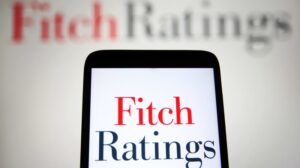
International rating agency Fitch Ratings predicts that Ukraine’s current account deficit will increase this year to 14.5% of GDP from 7.2% of GDP in 2024 and 5.3% in 2023, reflecting high gas and steel imports and lower remittances from Ukrainian refugees, as well as high defense imports and exports of goods, which are 38% below pre-war levels.
Inflation is forecast to average 12.3% in 2025, before slowing to 6.5% in 2026 as base effects and monetary policy transmission gain traction.
Fitch also lowered its GDP growth forecast for Ukraine for 2025 from 2.9% to 2.5% due to challenges related to ongoing labor market tensions, damage caused by attacks on gas infrastructure, and the closure of Pokrovskugol due to hostilities.
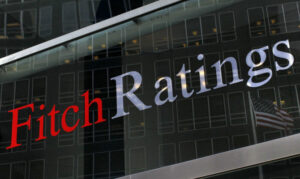
Fitch Ratings has affirmed Ukraine’s Long-term foreign currency Issuer Default Rating (IDR) at “CC”, the agency said in a statement on its website.
“The affirmation of Ukraine’s IDR in foreign currency at ‘CC’ reflects Fitch’s expectations for further restructuring of commercial debt before the end of the two-year break in Eurobond payments in September 2024,” the agency said.
It notes that sovereign foreign debt service will increase to $7.6bn in 2025, large budget deficits over the medium term will increase already high public debt and burden sharing with commercial creditors is a likely condition for continued official sector support.
According to Fitch, Ukraine is likely to opt for a single comprehensive debt restructuring next year. However, if security uncertainty persists, the agency expects an interim step in the form of a further deferral of Eurobond payments, similar to how official creditors have agreed to extend the moratorium on payments until the end of 2026 under the EFF with Ukraine.
It is also clarified that Fitch has affirmed the IDR at “CCC-” in local currency. It explained that the higher rating than that of the debt in foreign currency reflects the greater obstacles to restructuring the debt in local currency, given that only 4% belong to non-residents, while 48% belong to the National Bank of Ukraine and 38% to Ukrainian banks, including half of the state banks.
“We do not see significant international pressure to restructure domestic debt, including due to risks to domestic demand for government debt and confidence in banks. Nevertheless, there is still significant credit risk over the longer term, given uncertainty about the sources of funding for a potentially protracted war and a significant recovery effort,” the report said.
According to it, Fitch’s baseline scenario assumes the war will last until 2024 within its current broad parameters.
“We believe that Ukraine currently has a strategic military advantage, backed by modernized weaponry, Western intelligence, and firm resolve. However, in our core scenario, military superiority is not sufficient for decisive achievement of objectives,” the rating agency pointed out.
It added that there is also a lack of politically credible concessions that could form the basis of a negotiated settlement, which could lead to a very protracted conflict.
“In the longer term, we expect some form of settlement to end the war, although we think a frozen conflict is more likely than a sustained peace agreement,” Fitch wrote.
It predicts GDP will grow by 3.5% in 2023 and 4.0% in 2024 after a 29% contraction in 2022. According to the agency, consumption will recover somewhat on easing fears of a broader military escalation, but investment remains depressed. Fitch believes this year’s planned $14 billion in emergency recovery spending will fall short.
The agency expects the budget deficit this year to rise to 17.3 percent of GDP from nearly 16 percent of GDP (25 percent of GDP excluding international grants) last year because of war-related spending and a reduction in the grant component of budget support.
“We expect the deficit to remain high in the medium term, in part because of huge reconstruction needs and structurally higher defense spending than before the war,” the report states.
The agency adds that it sees greater uncertainty about external financing beyond next year, in part because of potential donor fatigue.
Fitch also predicts that the government debt will rise to 85% of GDP by the end of 2023 and to 94% by the end of 2024, while last year it increased by 30 percentage points (p.p.) to 78.5% of GDP.
According to the agency, the USD/UAH peg will remain in place until 2023, with a moderate depreciation in 2024 as the exchange rate becomes more flexible and exchange controls gradually loosen.
Fitch also forecasts an increase in the current account deficit to a deficit of 1.8% of GDP in 2023 and 3.5% in 2024, from a surplus of 5% in 2022, as imports recover faster than exports.
“Large official sector loans and gradually improving net migration help bolster our forecast of an increase in international reserves to $38.9 billion at the end of 2023, equivalent to 4.8 months of current external payments, above the median for all B-rated sovereigns,” the report said.
Fitch forecasts that inflation will fall to 14.5% at the end of this year and to 12.7% on average in 2024 from 15.3% at the end of May and 26.6% last year. According to the agency, the National Bank will lower the discount rate by 5 p.p. – to 20%, but the risks are still skewed upwards, including the consequences of the Kakhovka dam collapse.

International rating agency Fitch Ratings has affirmed Ukraine’s Long-term foreign currency Issuer Default Rating (IDR) at “CC”, the agency said in a statement on its website.
“The affirmation of Ukraine’s ‘CC’ long-term foreign currency IDR reflects Fitch’s view on the likely further restructuring of its commercial debt in foreign currency, given the scale of economic damage from the war with Russia and the significant financial damage associated with it,” the agency explains its decision.
Fitch believes that burden sharing with commercial creditors is a likely condition for large financial assistance provided by international official creditors.
The agency notes that a 24-month grace period on Ukraine’s Eurobonds, reached in August 2022, provided relief on servicing Ukraine’s $6 bln external debt, but leaves unresolved medium-term debt sustainability risks. It estimates that sovereign foreign debt service will rise to a relatively high level of $5.4 billion in 2024 (excluding $3.5 billion of deferred interest payments on Eurobonds that can be capitalized) and $7.0 billion in 2025, laying the groundwork for a possible new restructuring.
Fitch forecasts Ukrainian GDP growth of 2% in 2023, as the ongoing war prevents the return of significant numbers of refugees or large-scale investment, and power outages following Russian shelling create an additional constraint. The agency recalls a GDP decline of about 31 percent in 2022 and a net outflow of 8 million people, according to the UN, while pointing to a possible overstatement.
The agency predicts that inflation will fall to 21% in 2023 from 26.6% in 2022 as lost production capacity, power shortages, and only gradual elimination of supply chain disruptions offset weak domestic demand.
Fitch expects the war to continue in 2023 within its current broad parameters, as there are no politically credible concessions in the near future that could form the basis of a negotiated settlement. The agency believes that President Putin’s goal remains to undermine the sovereign integrity of the Ukrainian state, while Ukraine’s successful counterattacks in Kherson and Kharkiv make it even less likely that it will cede its territory to Russia.
According to Fitch, although the strategic advantage has shifted more in favor of Ukraine in recent months, neither side appears to have a decisive military advantage to achieve the objectives that could lead to a protracted conflict. “Over a longer period, the prospect of a negotiated settlement becomes more likely as the costs to both sides increase, although this may well take the form of a ‘frozen conflict’ rather than a sustainable peace,” Fitch admits.
Fitch forecasts the deficit to shrink to 15.2% of GDP in 2023 from 20.1% of GDP in 2022 because of the partial implementation of budgeted cuts in real terms to social spending and slightly higher grants, but defense spending remains well above the government’s target. “We expect high deficits in the medium term due to reconstruction needs, increased social spending, including on war veterans, and increased prewar defense spending,” the agency adds.
Fitch also estimates a 37 percentage point (pp) increase in total government debt to GDP in 2022 to 80.2% (excluding government guarantees of 7.5% of GDP) and forecasts it will rise to 84.0% by the end of 2023. It adds that the share of government debt in foreign currency has risen to 66%, which has increased currency risks, although the share of long-term concessional debt has also increased.
The agency expects the goal of raising $38bn in external budget funding in 2023 to be fully achieved, and the local currency public domestic debt rollover ratio, which fell to 65% in 2022, will partially recover this year thanks to recent changes in reserve requirements, further growth in government bond yields and the current record high level of bank liquidity, which will reduce the National Bank financing of the state budget deficit.
“Little is currently known about sources of funding beyond this year’s end due to risks associated with potential donor fatigue, increased stress in the banking sector weakening demand for domestic debt, and restrictions on the use of NBU fiscal funding if inflation remains high and external financing pressures resume,” Fitch notes/
It adds that the size of capital outflows from the private sector remains relatively stable, restrained by capital controls, and international reserves stood at $28.5bn at the end of 2022, up from $27.6bn at the end of February. Fitch forecasts that the current account surplus will shrink to 2.6% of GDP this year amid higher import growth, and international reserves will be 3.8 months of current external receipts at the end of 2023, down from 4.0 months at the end of 2022.
The local currency IDRs are affirmed at “CCC-“: the lower default risk than for foreign currency debt reflects a greater barrier to including local currency debt in any further debt restructuring, given that non-residents hold only 5%, while 55% is held by the NBU and another 32% by the domestic banking sector (half owned by the state), for which financial stability risks may be associated.
“We also do not expect strong international pressure to restructure domestic debt, partly because of additional concerns that this could undermine efforts to revive demand for new government debt issuance,” Fitch said.
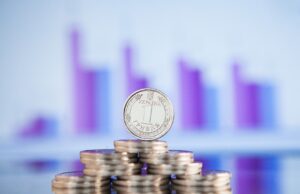
Fitch Ratings has affirmed Ukraine’s Long-Term Foreign-Currency Issuer Default Rating (IDR) at ‘B’ with a stable outlook, the agency said on its website.
“Ukraine’s ‘B’ IDRs reflect its track record of multilateral support and a credible macroeconomic policy framework that has underpinned a relatively high degree of resilience to the coronavirus shock. Ukraine’s human development indicators compare favorably with the peer group, it has a net external creditor position of close to 13% of GDP, and general government debt is somewhat lower than the ‘B’ median. Set against these factors are weak governance indicators, a high degree of legislative and judicial risk to policy implementation, and low external liquidity relative to a large sovereign external debt service requirement,” Fitch said.
“The stable outlook reflects expectations for gradual fiscal consolidation and continuation of macroeconomic policies that helped preserve broad stability in external finances during last year’s shock. The ability to issue eurobonds and available domestic liquidity has provided some limited space to manage a delay over the next six months in completing the first review of the IMF Stand-By Arrangement (SBA). The coronavirus shock temporarily reversed improvements made in recent years in terms of a declining debt burden and normalization of growth prospects after the 2014-2015 geopolitical and economic crises. At the same time, the political position of the administration has weakened somewhat and recent Constitutional Court policy reversals further underline the risks to SBA compliance, which constrain the rating,” according to the document.
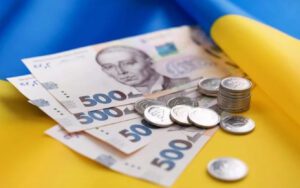
Fitch Ratings has affirmed Ukraine’s Long-Term Foreign-Currency Issuer Default Rating (IDR) at ‘B’ with a stable outlook, the agency said on its website.
Ukraine intends to increase the inflow of foreign direct investment (FDI) by 2025 to $15 billion per year, while at the end of 2020 their outflow amounted to $420 million, and in 2021 the National Bank predicts a recovery in FDI inflows at the level of $3 billion.
Ukraine in 2020 climbed from 80th to 63rd place in the Social Progress Index among 163 countries with score of 73.38 points versus 66.97 in 2019, according to the index data.
The Ministry for Development of Economy, Trade and Agriculture of Ukraine estimates the drop in GDP in January 2021 at 2.6-2.8%, according to the January review of economic activity in the country posted on its website.
The total public debt of Ukraine in February 2021 increased by 0.74% in U.S. dollars, to $ 91.41 billion and decreased by 0.21% in hryvnias, to UAH 2.552 trillion, according to data on the website of the Ministry of Finance. The ministry said the total national debt decreased in hryvnia equivalent by UAH 5.28 billion, mainly due to a reduction in guaranteed debt.
The Ministry for Development of Economy, Trade and Agriculture maintains its forecast for the growth of Ukraine’s GDP in 2021 at 4.6%, Minister Ihor Petrashko, has said, commenting on a statement by Deputy Head of the Office of the President Yulia Svyrydenko about the expected GDP growth of 5.1% in 2021.
The deficit of Ukraine’s foreign trade in goods in February 2021 fell by 47.5%, to $0.32 billion, while the deficit of foreign trade in January-February 2021 slightly grew – by 5.9%, to $0.6 billion
The growth of consumer prices in Ukraine in February 2021 accelerated year-over-year to 7.5% from 6.1% in January and from 5% in December 2020, the State Statistics Service said.
The total public debt of Ukraine in February 2021 increased by 0.74% in U.S. dollars, to $ 91.41 billion and decreased by 0.21% in hryvnias, to UAH 2.552 trillion, according to data on the website of the Ministry of Finance.
Prices in Ukrainian industry in February 2021 increased by 7.8%, while in January 2021 – by 5.2%, and in December 2020 – by 1.8%, the State Statistics Service said.
Industrial production in Ukraine in February 2021 decreased by 4.6% compared to the pre-COVID February 2020, and adjusted for the effect of calendar days (last year was a leap year), the reduction was noticeably smaller – 2%, the State Statistics Service said.
The lack of institutional regulation in the agro-industrial complex led to a decrease in agricultural production by 11.5% in 2020 compared to the previous year, and crop production fell by 13.6%, Minister of Agrarian Policy and Food of Ukraine Roman Leshchenko said during a discussion of the draft National Economic Strategy 2030.
The transport companies of Ukraine in January 2021 reduced carriage of goods by 2.2% compared to January 2020, to 42.8 million tonnes, the State Statistics Service has said.
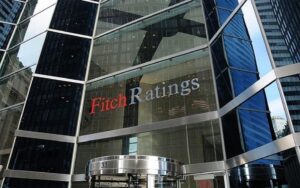
Fitch Ratings has revised Metinvest B.V.’s outlook to stable from negative, the Long-Term Issuer Default Ratings (IDRs) and senior unsecured rating for the bonds of the Ukrainian integrated steel company are affirmed at ‘BB-‘, the recovery rating is ‘RR4’, the rating agency said on its website. “The revision of Metinvest’s outlook reflects strong cash flow generation linked to supportive steel and iron ore markets amid the global economic recovery and our expectation of a gradual reduction of gross debt to $ 2.9 billion ($ 2.5 billion net; both Fitch-adjusted values) over the next three years. It also takes into consideration that some of this cash flow will be used for earnings accretive growth, including taking control of Pokrovske Coal and incremental capital expenditure,” the report says.
“Fitch now forecasts funds from operations (FFO) gross leverage of 1.5x-1.6x over the medium term, providing for very comfortable headroom compared to the negative ratio guideline of 2.5x for the ‘BB-‘ rating. But we note that the company does not have a formal dividend policy or gearing target,” it says.
Metinvest is a vertically integrated group of mining and metallurgical enterprises. Its enterprises are located in Ukraine – in Donetsk, Luhansk, Zaporizhia and Dnipropetrovsk regions, in European countries. In particular, in Bulgaria there is Promet Steel plant with a capacity of 500,000 tonnes of rolled metal per year, in Italy – Metinvest Trametal and Ferriera Valsider with a total capacity of 1.2 million tonnes per year. In the UK, the company owns Spartan UK plant that can produce 200,000 tonnes of rolled steel per year.
The main shareholders of the holding are SCM Group (71.24%) and Smart-Holding (23.76%), which jointly manage it.
Metinvest Holding LLC is the management company of Metinvest Group.
© 2016-2026, Open4Business. All rights reserved.
All news and diagrams placed on this Web site is made for internal use. Its reproduction or distribution in any form are welcome in case of placing a direct hyperlink to a source. Reproduction or distribution of information which contains Interfax-Ukraine as a source is prohibited without the written permission from the Interfax-Ukraine news agency. Photoes placed on this site are taken from open sources only; rightholder are welcome to make demands to info@open4business.com.ua , in this case we are ready to put your copyright to a photo or replace it.